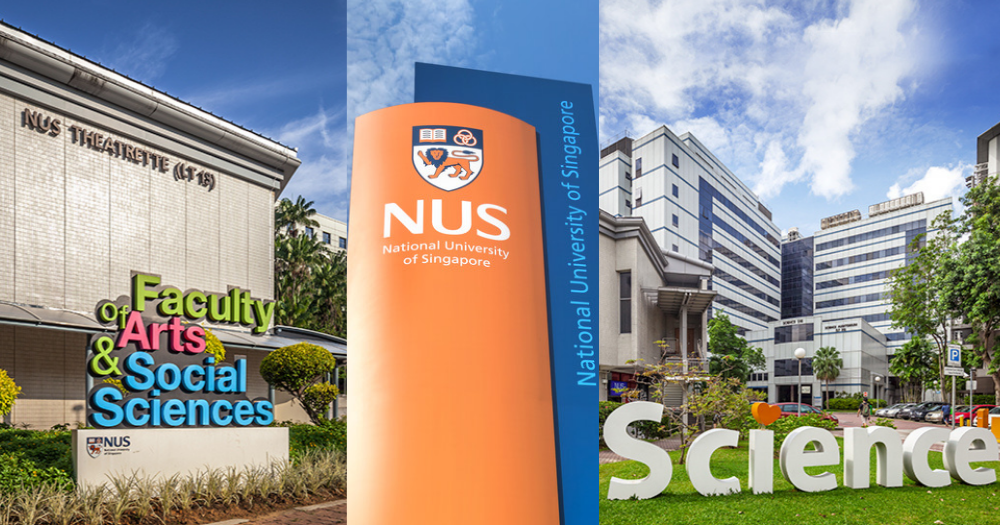In September 2020, the National University of Singapore (NUS) announced that it was carrying out preliminary consultations with faculty members of the Faculty of Arts and Social Sciences (FASS) and the Faculty of Science (FOS) on a potential new college focusing on interdisciplinary education.
On Tuesday (Dec. 8), NUS officially launched the College of Humanities and Sciences (CHS), which will accept its inaugural cohort of students for the academic year 2021/2022.
Shift to interdisciplinary curriculum between FOS and FASS
Students who are accepted into the virtual college will belong to both the arts and science faculties, which will allow them to access both majors and minors under the two faculties.
CHS will admit more than 2,000 undergraduate students each year.
Starting in academic year 2021/2022, there will no longer be undergraduate students who are solely part of FASS or FOS; instead, they will all be under CHS.
CHS students will be able to pursue any major, second major, major-minor, and specialisation pathway offered by FASS or FOS.
Students can opt to declare a major when entering CHS, but have the option to change it at any time, or to enter university with an undeclared major.
More than 1,000 modules per academic year will be available to CHS students.
They will be able to choose to specialise in their chosen field or to build expertise in multiple subjects and gain interdisciplinary insights.
Students can pursue the following four-year honours degree programmes:
- Bachelor of Arts
- Bachelor of Social Sciences
- Bachelor of Science
There are also specially-curated cross-disciplinary degree programmes, which are driven by market forces. Currently, CHS will offer the following cross-disciplinary degrees:
- Data Science and Economics
- Environmental Studies
- Philosophy, Politics and Economics
The University also plans to unveil seven more cross-disciplinary degree programmes in the coming years, covering areas such as computing, business, engineering, and medicine.
Common Curriculum
CHS will have a Common Curriculum, which comprises 13 interdisciplinary modules, or one-third of the total curriculum.
Here are the modules that students will take as part of CHS:
- Five integrated modules: Scientific Inquiry I, Scientific Inquiry II, Asian Studies, Integrated Social Sciences, and Integrated Humanities
- Six General Education modules: Computational Thinking, Quantitative Reasoning, Design Thinking, Community and Engagement, Artificial Intelligence, and Writing
- Two interdisciplinary modules of the students' choice
"We've designed this structure, so that the students can be prepared for the digital world, and for the future of change," said Associate Professor Chew Fook Tim, Vice Dean for Undergraduate Studies and Student Life for FOS.
A key element of the interdisciplinary education offered by CHS will be problem-based pedagogies — that is, teaching focused on problem-solving rather than solely for imparting content.
These problem-based pedagogies will be reinforced with experiential learning through internships, fieldwork, and capstone projects, which will allow students to gain more real-world experience and increase their market relevancy.
Parallels with Yale-NUS College
The new programme has a number of notable parallels with Yale-NUS College's programme, including having a Common Curriculum that makes up about one-third of the total curriculum, courses such as Scientific Inquiry I and Scientific Inquiry II, and degrees in Environmental Studies and Philosophy, Politics and Economics.
While the structure is very similar to that of Yale-NUS College, NUS President Professor Tan Eng Chye said, the scale is very different.
FASS has about 300 faculty members and FOS has about 250, while Yale-NUS has only about 100 faculty members.
Both FASS and FOS are also very research-intensive, which means that the programmes and disciplines that they can offer are "much, much greater", said Tan.
This leads to a "much richer and more diverse" offering from the joined forces of FASS and FOS, because they are larger.
However, Tan noted, Yale-NUS College is different from CHS because it is a smaller and fully-residential programme, where learning is integrated into the Residential College programme.
Thus, students who are looking for a closer and more integrated, residential programme would be able to find that at Yale-NUS College.
First in NUS' pipeline of new initiatives
CHS is the next step in NUS' efforts over the years in transitioning towards offering students a more flexible and integrated education.
Tan said:
"Interdisciplinary studies have been in the University's DNA over the last 20 years, with initiatives like the Special Programme in Science, University Town College Programme, University Scholars Programme and Yale-NUS College.
With the new CHS, we will offer our distinct interdisciplinary curriculum at scale, by building on the deep research expertise of two of the largest and most established faculties in Singapore."
The CHS is not a standalone effort, said Tan. Rather, it is the first in a pipeline of new initiatives by NUS to offer more interdisciplinary experiences to students, with the goal to expand to the rest of NUS.
More details about these new initiatives will be announced at a later date.
Totally unrelated but follow and listen to our podcast here
Top photos via NUS website.
If you like what you read, follow us on Facebook, Instagram, Twitter and Telegram to get the latest updates.
